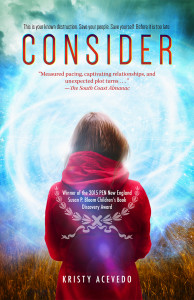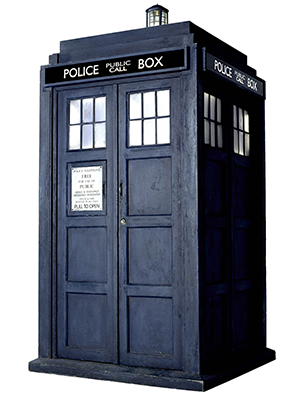CONSIDER by Kristy Acevedo
Chapter 1
Day 1-August
When the Boston outbound T screeches to a stop, I lose my grip on the silver pole and slam into Dominick. His black rimmed glasses twist on his face, but he retrieves my purse from the floor before straightening them.“
You okay?” he asks and hands me my bag.
I nod and try to act nonchalant as I glance out the dark windows at the distant headlights of highway traffic. The train has stopped somewhere after the North Quincy station.
My mind begins to calculate and unravel in a spiral of possibilities. Could be a suicide. Or a terrorist attack. Maybe a car exploded. With babies inside. Decapitated. And one survivor, the driver, left screaming on the side of the road. Little bloody hands and feet scattered on the tracks. Tiny severed toes.
I fish in my purse for my anxiety meds and pop one little white savior.
“Seriously?” Dominick asks. “You already took one at the concert.”
“It wore off.” I swallow before he makes me feel guilty.
Other passengers mutter about the delay, and each complaint seeps into my skin and mingles with my fears. "I knew we shouldn’t have taken the train.”
“Cheaper than parking at the Garden. Plus, no traffic.”
“Except we’re stuck.” Dad wanted me home by 11:00, and my phone says it’s already 9:45. If we don’t get moving soon, I’m never going to make it home in time.
The image of tiny severed toes repeats in my brain.
“Why do you think the train stopped?” I ask. “You think someone pancaked on the tracks?”
“No, no. Probably something electrical. Happens all the time.”
Pancaked. Brain oozing on the tracks. A mother with a spatula and tears.
I swallow hard and cross my arms over my chest. “I bet it’s a suicide. Or a terrorist attack.”
“No, it’s nothing. It’ll be fine.” He moves in closer and brushes my neck with his fingertips. “Plus, I love being stuck with you. Too bad you need drugs to be stuck with me. Stop worrying.”
He always takes my anxiety personally. Like being with him should be a magical cure since he cares. But telling me not to worry is like telling me not to breathe. It’s like tickling someone to cure depression.
To escape the gruesome images in my head, I trace the pale scar on Dominick’s middle knuckle with my pointer finger, the scar he got trying to gut a striped bass for the first time with his father. He tucks one of my golden brown curls behind my ear. His thumb slides down my neck and runs along the strap of my sundress, sending shivers across my shoulders even though the air conditioner is malfunctioning as usual. His touch brings me out of my head and back into my body. I wish we were alone.
“I can’t believe we only have a few weeks left of summer,” he whispers.
I peck his cheek. “I know. It went by so fast.”
We both know what we’re not saying. Senior year. Pressure’s on. We started dating in April of our junior year, and only four months later, we already have to make major college decisions that could pull us apart. It’s time to start my slow transformation into Alexandra Lucas, Kick Ass Lawyer, and I’m afraid to let anything distract me from that future. Even him. It’s hard enough for me to stay focused.
A sweaty man to my left bumps me with his shoulder and apologizes. His body odor absorbs my oxygen and makes my stomach twist. I lose focus on Dominick. To ground myself, I stare at the rainbow swirl pattern on the seats, the fake marbled black and white floor. The air becomes too heavy to breathe, too thick for my lungs to process.
What if I’m being poisoned by everyone’s carbon dioxide? The intense urge to pry the doors open or claw my way out of the tinted windows for fresh air builds inside me. Ativan, please don’t fail me now. It usually takes ten minutes or so to kick in, so until it does, I need to focus on anything other than the fact that I’m trapped in a hot, crowded train.
Think positive: At least we're not stuck underground. Maybe I should pick a fight with Dominick. Arguing cancels out my anxiety. That’s why I’ll make an amazing defense lawyer, arguing my way to mental health while helping the underdogs of the world get a break for once.
My cell phone blares the Twilight Zone theme song, snapping me into the moment. A shriveled woman sitting behind me jumps and mutters, “Jesus,” so I silence my phone before answering.
Rita Bernardino’s name appears on the screen under a picture of the three of us at our annual beach bonfire. My best friend never calls. Only texts. She doesn’t wait for hello.
“Alexandra?” She only ever calls me Alex.
“What’s going on?” I ask, then mouth Rita’s name to Dominick. He raises one eyebrow behind his glasses and makes a goofy face by touching his tongue to his nostril. Wish I had time to take a photo so I could remember him like that.
“Did you see the news?” she continues in rapid speech.
“No, I’m stuck on the train with Dominick. What’s wrong?”
Rita starts screaming facts that don’t register in my brain. “In the last ten minutes—over three hundred so far—”
“Wait, slow down. What are you talking about?”
Sitting across from me, an elderly man wearing a corduroy coat much too heavy for early August rises from his seat. He points his arthritic finger at something beyond the window glass ahead of the train. “God have mercy on us,” his voice cracks.
People jump from their seats and crowd the windows. Dominick pulls me closer as we fight for a view. Rita continues yelling nonsense into my ear.And then I see it. The train didn’t stop for a suicide. Or a terrorist attack.
It’s something. Else.
If I could take the idea of technology and somehow turn it into a living thing, it would look like this thing. The size of a doorway, it glows a deep electric blue, the center shimmering like a metallic, moving liquid. Like something has punched a hole into the fabric of the universe.
“No one knows what’s going on,” Rita reports from my phone. I hadn’t realized she was still talking, and she’s not an easy person to ignore. “Eyewitness reports rolling in. They’ve appeared all over the world."
“We’re near one now,” I manage to say. It takes more effort than I expect to speak. “I think the train stopped”—I take a breath—”since it’s close to the tracks.”
“No way.” She pauses. “Take a picture.”
“I’ll call you back.” I hang up without listening for her response. My heart and lungs compete in a death match for my attention. I relay the jumbled information to Dominick and other passengers. Most people aren’t bothering to listen; faces are glued to phones and thumbs are doing the communicating.
An MBTA conductor’s voice booms over the crackling loud speaker: “We’ve been advised to stop travel at this time. Please remain calm and exit the train when the doors open. Alternative transportation will be provided shortly.”
One lady weeps. Another blesses herself with the sign of the cross and kisses a gold crucifix dangling from her necklace. She grips it so hard I’m afraid it’s going to puncture her palm. Others stare out the window at the oval phenomenon hovering near the tracks in front of the train. Some hold up their phones to capture it on video.
My stomach churns like an angry ocean. I step away from the windows and take in a deep breath for a count of five, hold it for a count of two, and let it out slowly in another five like I’ve been trained to do when my anxiety escalates. I repeat the ritual, but it’s not designed for actual moments of terror. Dominick notices and squeezes my hand. My prescription beckons me from my purse, but two pills in one night is already pushing it.
A woman around my mother’s age bursts into a fit of angry tears. Her traveling companion rubs her shoulders. I try not to stare.
Police officers, firefighters, and ambulances arrive and form a barrier around the supernatural occurrence. An army of city buses charges over the dark horizon and lines up in an abandoned lot to carry us to our destinations. My escape route from the mass of bodies surrounding me.
“Holy crap,” another teenager says, holding the visor of his Red Sox hat. “Holy crap.“
“Open the goddamn door,” the old man in the corduroy coat yells. “Let us out of here!”
My feelings exactly. I focus on breathing again and visualize my safe space. Island. Hammock. Book to read. Dominick catches me rocking back and forth. I stop and feign coolness even though I’m ready to ignite.
“Are we gonna die?” a little boy asks his dad. The father lifts him onto his shoulders and says firmly, “Not on my watch.”
I catch Dominick staring at the boy and the father. It must be hard for him. I squeeze his hand again, and my own worries sink from the surface.
Two high-pitched beeps fill the train before the automatic doors open. People file out in clusters. I’m not sure if we are being rescued or trading one bad situation for something worse. It seems wrong to leave the train in the middle of the tracks.
We have to pass the thing in order to cross the tracks and reach the buses. As we approach, no one talks. The danger creates a type of reverent silence.
What if I accidentally fall inside? What if it’s a black hole and it swallows us all? What if it’s an alien-powered vacuum cleaner and we’re the dirt?
Up close, other colors swirl inside of it, embers of green, silver, and a bright darkness. My eyes can’t seem to focus on the depth. It’s like watching a 3D movie without the glasses. Except instead of the 3D images projecting forward, the colors are falling inward. Like an enormous, ridiculous, technological bellybutton.
The crowd fades into the periphery, and I forget about my own safety. The blue glow illuminates Dominick and me. Maybe it’s the medication talking, but it’s like I’ve walked onto the set of a great sci-fi moment, and my brain can’t figure out if this is supposed to be scary or amazing.
It’s both.
“This is like something outta Stephen King” he says.
“Doctor Who. It has a happier ending,” I joke back nervously. My pill has definitely kicked in. Like a warm invisible blanket has wrapped around my organs.
The crowd inches forward since no one wants to pass it. People continue to hold up their cell phones and take videos. The cops try to herd us over to the buses. Dominick squeezes my hand tighter. It keeps me grounded.
Then Something pushes through the blue fire in the oval.
The cops draw their weapons. Some people scream and run. I don’t. Dominick pulls my hand to move, but I pull back. I’d like to credit my compulsion to stay on curiosity or stubbornness, but more likely it’s the result of my meds dulling my reaction time.
The Something looks like a transparent human in a gray uniform. I can’t take my eyes off it.
“Hello,” it announces to the crowd. “We’ve come to save you.”
First contact. Binge-watching thousands of hours of sci-fi shows has trained me for this moment. I want to say, “Greetings from Earth, live long and prosper,” or stick my pointer finger out at it and ask, “Phone home?” but my stomach has swallowed my voice, a first for me.
“Freeze!” yell several cops at once. “Hands up!”
It reaches into its translucent coat pocket. And they open fire.
Dominick forces me to the ground and lays his body on mine. I watch over his shoulder as the bullets pass right through the ghostly figure. The transparency gradually fills in, gaining weight and dimension, yet the bullets still have no effect on its now opaque body. It’s the most advanced holographic image I have ever seen. More like an actual person than a projection of light.
The cops realize their error and cease fire. They shout at everyone to evacuate to the buses immediately for our own safety. Dominick pulls me up from the ground and straightens his glasses. I know I should leave, but my brain still wants to know what’s going on. Ambiguity breeds anxiety.
The androgynous hologram holds out one hand like a mime and reveals a slip of paper the size of a sticky note. Everyone stops to watch. It’s not a trick; we aren’t under a type of mind control or magical spell. Our instincts simply recognize the moment as one for history, regardless of the consequences.
The paper unfolds to form a three-dimensional image of Earth. The hologram sets it on its palm, and the paper Earth begins to rotate. Then in a calm, emotionless voice, it announces:
“We are humans from a parallel future in the year 2359. We are here to save you. In six of your calendar months, a comet will destroy your planet. This is your known destruction; there is no way to prevent it."
The paper Earth silently ignites into a fireball, and then all traces of it vanish before our eyes. “We have opened five hundred vertexes across your planet to send you to our time and dimension. We have enough space to accommodate all who wish to join us. Simply walk through one person at a time. It is your individual choice. Please bring minimal personal items. You will be given all the resources needed to live here.
“We apologize for using images as representatives, but we can only carry physical beings in one direction. Our images are equipped to answer your questions using our standard database responses available in multiple human languages.
“This automatic message will repeat once a day at each vertex location. You have approximately four thousand three hundred ninety-four hours to decide. The vertexes will remain open until then.
“Consider. Save your people. Save yourself before it is too late.”
The crowd stands like a dangling participle, confused, pointless. Sweat beads down my spine, and my pulse pounds behind my eardrums. Everything around me seems muffled, slow.
A bearded man from the horde breaks the silence and shouts at the hologram, “Who are you?”
I can’t believe he asked that question. Wasn’t he paying attention?
The hologram responds, “We are humans like you.”
“Humans, my ass. This is alien invasion shit.”
The hologram responds, “We do not understand.”
The crowd laughs uneasily. “They’re not as smart as they think,” a woman whispers to Dominick and me.
I can’t laugh with them. A question burns inside my head, but my mouth battles with my mind for freedom and words. I take a deep breath and let loose. “Why should we believe you?” I yell out over the crowd.
The hologram responds, “You have no other options.”
(End of Chapter 1)
Excerpted from CONSIDER by Kristy Acevedo. Copyright ©2016 by Kristy Acevedo. Excerpted by permission of Jolly Fish Press, LLC. All rights reserved. No part of this excerpt may be reproduced or reprinted without permission in writing from the publisher.CONSIDER hits shelves April 19, 2016. Please add it to your Goodreads!








